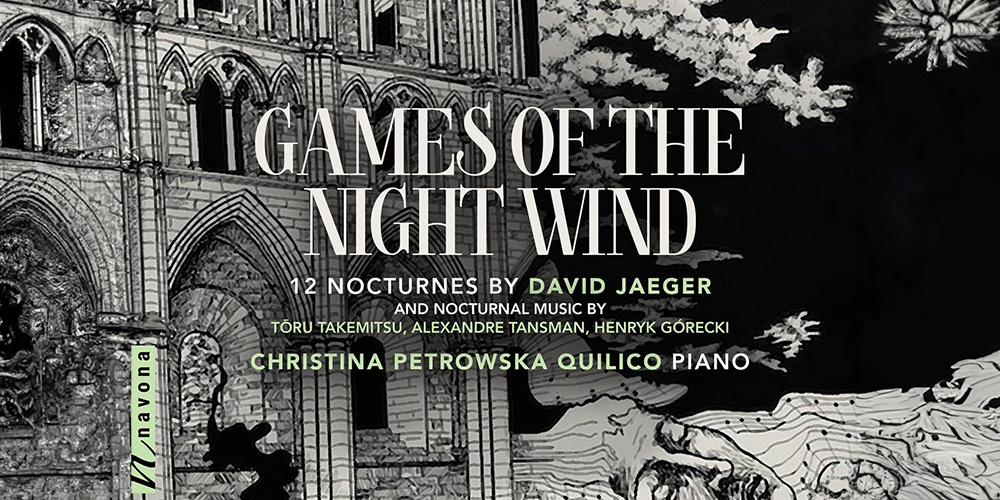Two titans of the Canadian music scene, composer David Jaeger and pianist Christina Petrowska Quilico, come together on Games of the Night Wind. Enhancing the appeal of their collaboration, the album intersperses twentieth-century solo piano works by Toru Takemitsu, Alexandre Tansman, and Henryk Górecki in amongst the dozen nocturnes by Jaeger.
Arriving after last year’s Chamber Music for Viola (Navona Records) and Elizabeth Reid’s Conjuring: Viola Music of David Jaeger (Redshift Music), this latest Navona release continues a very productive period for the Canadian composer, whose place in the country’s music history books is secured by his membership in the pioneering and still-active Canadian Electronic Ensemble (CEE) and for his championing of contemporary music as the creator and executive producer of CBC’s influential Two New Hours program. While those 2023 releases obviously concentrate on works for viola, a great deal of his time and energy over the past decade has gone towards writing material for piano. A member of the Order of Canada and Order of Ontario, Quilico has been a long-time supporter of Jaeger’s work and a frequent collaborator with the composer. Her exquisite touch and musicality are well-equipped to give voice to the cryptic mysteries of the new work’s night-themed parts.
Games of the Night Wind originated out of a collaboration Jaeger initiated with Scottish poet David Cameron in 2019. Having earlier set some of his poems as songs, Jaeger created pieces with him that paired piano accompaniment with Cameron’s recitations. It struck Jaeger that those same pieces could also work effectively as solo piano works with the spoken word component replaced by additional music. The developing work expanded to include poems by Seán Haldane, Bruce Whiteman, and Quilico herself, who had responded enthusiastically when Jaeger shared details with her about the work-in-progress. It’s fascinating to study the connections between the poems’ texts and the instrumental music Jaeger fashioned with them in mind (it’s possible, for example, to draw parallels in the third nocturne, “Tumult,” between piano phrases and the noises made by crows), but the material doesn’t suffer in any way when experienced as standalone musical expressions.
Setting the stage for Jaeger’s enigmatic evocations is Takemitsu’s starry Les yeux clos, a poetic reverie as characteristic of the Japanese composer as Games of the Night Wind is of Jaeger. For seven-plus minutes, Quilico sprinkles notes delicately across the musical canvas, with each crystalline splash of colour twinkling vividly like stars in the sky.
Many of the parts in Jaeger’s set are miniatures that, despite their concision and compression, impart power, intensity, and suggestion. It begins auspiciously with the solemn “In Memory Of” delivered by Quilico in a ponderous rubato, with the second nocturne, “A Blessing,” exuding dynamism and palpable energy. Desperation wells up during “The Murmur” when an inner cry from the heart manifests as an anguished shout. Whereas darkness permeates “The Holes of Night,” its musical tone a fitting match for the psychic disturbances catalogued by Quilico in her poem, the robust sixth, “Forget the Day,” focuses on the alluring qualities that for her the night offers (“There is nothing real outside the periphery of dreams”). In the seventh, “The Red Deer,” an unexpected encounter with nature induces an epiphany Jaeger deftly reflects in his music construction. Real-world concerns emerge via his self-explanatory “Lament for the People of Ukraine,” while the shadowy tenth, “Games of the Night Wind,” dramatically alludes to the wildness associated with the nocturnal realm. As the work advances to its close, Cameron ponders the elusiveness of the artist’s muse in “Conjure You” (“Is there a letter that could conjure you? Or what metamorphosis must I go through?”).
The late Polish composer Alexandre Tansman is represented by four prosaically titled nocturnes of his own. Gravitating away from the darkness of Jaeger’s “The Murmur,” Tansman’s opening setting opts for gentle illumination, the second and third fluid, folk-tinged lyricism, and the fourth subtle jazz inflection. Two pieces by Górecki appear on Games of the Night Wind, the hushed meditation “Intermezzo” and “Lullaby,” the gentle latter naturally arriving at album’s end. While their pieces and Takemitsu’s certainly give extra appeal to the release, it’s Jaeger’s twelve-part work that makes the strongest argument on behalf of the project. How wonderful to be witnessing such a creative outpouring at this later stage in his career.
